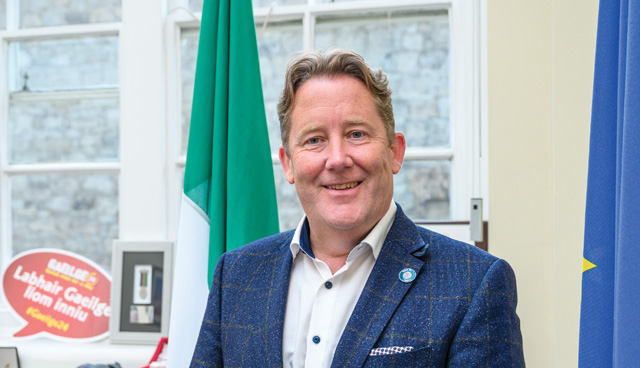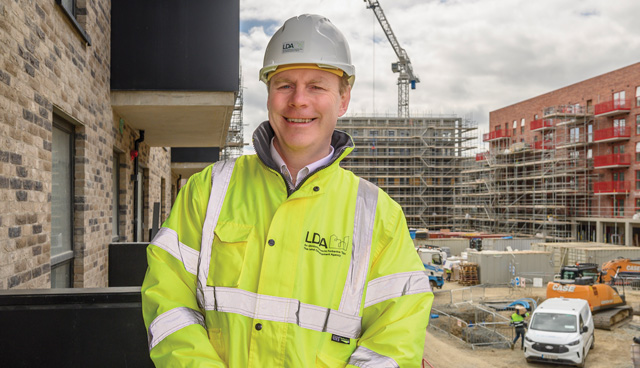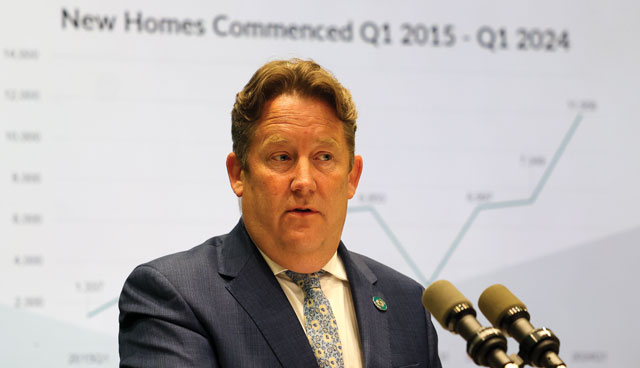
Recast Energy Performance of Buildings Directive: What does this mean for the residential sector?
4th July 2024
Design and delivery of affordable housing: Some of the best examples in Ireland
4th July 2024Homeownership schemes polarise discourse

While Taoiseach Simon Harris TD advocates for the Help to Buy scheme to be extended for five years, many in opposition believe the schemes are flawed.
Census 2022 indicates that that Ireland’s rate of homeownership stood at 66 per cent, a slight decline from the figure of 68 per cent in 2016.
When these figures were published, the Central Statistics Office (CSO) outlined: “The rate of home ownership continues to fall. It was 66 per cent in Census 2022, down from 68 per cent in 2016, and almost 70 per cent in 2011. Census 2022 shows that by the age of 36, more than half of householders owned their home (with or without a mortgage or loan).
“This age, which marks the changeover between home ownership and renting, has been increasing over time, up from 26 years in 1991, 27 years in 2002, 28 years in 2006, 32 years in 2011, and 35 years in 2016. In Census 1991, the age at which two-thirds of the householders owned their homes (with or without a loan) was 28 years. By the time of Census 2022, this age had risen to 44.”
However, most recent statistics for homeownership supports indicate that applications have slightly increased in 2023.
Help to Buy (HTB)
Published in February 2024, the most recent figures available from Revenue state that there have been 98,425 total HTB applications received up to 31 December 2023. 44,959 HTB applications have reached the claim stage by 31 December 2023, of which 44,281 are approved. The estimated total value of approved HTB claims to date is €927.3 million and the total value of approved and pending HTB claims to date is €938.4 million.
Regarding the application stage, 23,750 applications were received in 2023, based on the application start date. This figure includes approved and pending applications. 7,266 applications had advanced to the claim stage. In 2022, 24,520 HTB applications were received, with 6,922 advancing to the claim stage, representing a 5 per cent increase in claims in 2023.
First Home Scheme
2023 marked the First Home Scheme’s first full calendar year of implementation. The number of registrations that took place in 2023 totalled 5,097, with 7,530 since the launch. Out of the 5,097 registrations, there were 2,446 approvals in principle. This is a contrasting increase from the 750 approvals in 2022.
The value of funds drawn down equalled €73.9 million with 1,118 drawdowns in total. This is a stark contrast to the 137 total drawdowns and €57.6 million funding approved in 2022. Since the FHS launch, the average equity funding was €66,651 with the average FHS property price equating to €380,032.
78 per cent of live eligibility certificates issued have been for buyers in counties Dublin, Cork, Meath and Wicklow, with the remaining 22 per cent spread across 20 counties throughout the State.
Affordable Purchase Homes
In 2023, over 490 Affordable Purchase homes were delivered through the Local Authority Affordable Purchase Scheme. Additionally, 1,345 affordable purchase homes have been advertised in Carlow, Cork City, Cork County, Fingal, Kildare, Kilkenny, Laois, Louth, Limerick, Meath, South Dublin, Waterford, Westmeath and Wicklow. The Government states that these figures reflect a “good pipeline” of homes built from a standing start in 2022.
Perspective
Speaking with the Housing Ireland Magazine, Housing Minister Darragh O’Brien TD emphasises the importance he places on first time buyer supports, and states:
“We have close to 600 first time buyers per week now purchasing homes and we are very pleased with the progress, particularly in the First Home Scheme, which is a scheme many people were critical of at the start. It is really working, with around 10,000 registrations and over 5,000 approvals.”
However, Cian O’Callaghan TD for Dublin Bay North and Social Democrats housing spokesperson states that the Government has failed first time buyers: “We need homes that people can afford – not investment opportunities for speculators.”
Likewise, Eoin Ó Broin TD, Sinn Fein spokesperson on housing also believes that HTB is artificially inflating house prices meaning that “lots of other people are locked out of the market”. “Half the money that is spent on Help to Buy goes to people who do not need it. That is [supported by] independent research from the Oireachtas’ Parliamentary Budget Office and from Mazars [on behalf of the Department of Finance]. One-third of the people who receive it [support] do not need it – they already have a sufficient deposit and a mortgage to purchase,” he says.
The Housing Commission has recommended that the Government should use appropriately targeted equity loan schemes to support first time buyers to purchase a home, as provided for in the Affordable Housing Act 2021, and establish central revolving funds to manage capital derived from repayment of equity loans that are provided by the State or local authorities.
“While the Help to Buy scheme assists first time buyers (FTBs) by providing a tax refund that can be used to cover the cost of a deposit, some FTBs may still be unable to afford to purchase a home. In particular, the macroprudential mortgage lending rules may not enable FTBs to borrow sufficient funds to buy a new home in their preferred location”, the Report of The Housing Commission states.
| What is the Help to Buy Scheme?
Announced in Budget 2017 (October 2016), the Help to Buy (HTB) initiative aims to assist first time buyers with the deposit required to purchase or self-build a new house or apartment. The original incentive supplied a refund of Income Tax and DIRT paid over the previous four years, limited to a maximum of 5 per cent of purchase value up to a value of €400,000. This incentive was initially available for the period from 19 July 2016 to 31 December 2024. An enhancement to the existing HTB scheme was announced in the July 2020 Stimulus plan. The enhanced HTB relief provides that where applicants satisfy certain conditions, increased relief is available up to a maximum of €30,000 (the HTB fund was originally capped at €20,000), or 10 per cent of the purchase value. The enhanced rates applied from 23 July 2020 to 31 December 2025. |
| What is the First Home Scheme?
The First Home Scheme Ireland Designated Activity Company (FHS) is a shared equity scheme officially launched in July 2022. The FHS is a collaborative initiative between the State and participating lenders, aiming to bridge the gap for eligible customers between their deposit and mortgage, and the price or build cost of their new home (within price ceilings established across the State). Homebuyers receive funds in return for the First Home Scheme taking a percentage ownership in the property. The FHS is available to first time buyers (FTBs) and those who qualify under the Fresh Start Principle. The scheme aims to provide €400 million to facilitate the purchase or self-building of up to 8,000 homes over a three-to-five-year period. To facilitate the target, in 2023 two new products were launched by the First Home Scheme; the Tenant Home Purchase product and the Self-build product. |






